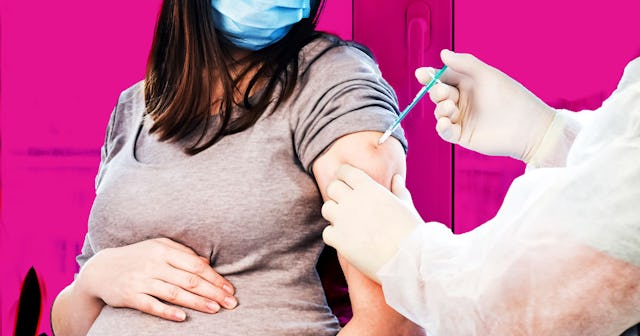From A High-Risk OB––5 Things To Know About Pregnancy And The COVID Vaccine

On August 11, the CDC made a bold announcement. For the first time during this pandemic, the CDC unambiguously urged all pregnant people to get vaccinated.
The CDC director, Dr. Rochelle Walensky, said, “CDC encourages all pregnant people or people who are thinking about becoming pregnant and those breastfeeding to get vaccinated to protect themselves from Covid-19.” She continued, “The vaccines are safe and effective, and it has never been more urgent to increase vaccinations.”
The new guidance comes amid a surge of cases as the Delta variant runs rampant around the country, and at a time when only about a quarter of those who are pregnant have received at least one dose of COVID vaccine, according to CDC statistics.
Scary Mommy spoke with Dr. Daniel Roshan, a top, high-risk maternal-fetal OBGYN in NYC, about the updated guidance and the most important things pregnant people should know about the COVID vaccine.
The Majority Of Pregnant Patients Should Get The Vaccine
The CDC and the American College of Obstetricians and Gynecologists (ACOG) urged all pregnant people to get vaccinated, and Dr. Roshan echoed that encouragement.
He confirmed that the “majority of pregnant patients should get the vaccine,” and noted that it’s rare to tell someone they should not get the vaccine right now.
Along those lines, he affirmed that pregnant patients can and should get vaccinated as soon as it’s available to them. There is no need to wait for a particular trimester.
The Risk Of Severe COVID Is Greater In Pregnant People
AndreyPopov/Getty
Pregnant patients are at a higher risk for severe illness. Pregnant patients who have “totally no risk” can end up in the hospital after COVID infection, says Dr. Roshan.
The data supports this. “There is a threefold increase of intensive care unit admission,” according to Dr. Mark Turrentine, an obstetrics professor at Baylor College of Medicine, who is also the co-chair of a COVID-19 work group for ACOG, “two-and-half-fold increase risk of being put on mechanical ventilation or bypass support, and there’s even, you know, a little over a one-and-half-fold increased risk of death.”
To be clear, the risk of COVID infection is not limited to the mother. Dr. Jessica Ehrig, the obstetrics chief at Baylor Scott & White Medical Center in Temple, explained the dangers to the baby in a recent press conference. She said, “Complications include preterm birth and prematurity, increased risk of preeclampsia for these moms — which can require preterm delivery.” Sadly, the risk of stillbirth is also increased, according to Dr. Ehrig.
The COVID Vaccine Is Safe
The vaccines are safe. Dr. Roshan affirms that there is “no harm in taking the vaccine. No risk of infertility. No risk of menstrual irregularity. It’s quite safe and effective.” He noted that there have been no reported problems from the vaccine during birth.
Early data from the CDC supports his conclusion. A CDC analysis of three safety monitoring systems found that there were no safety concerns for pregnant people who were vaccinated. Likewise, another report found that there was no increased risk for miscarriage among people who were vaccinated during the first twenty weeks of pregnancy.
The Pfizer And Moderna Vaccines Are Preferable Options For Pregnant People
Dr. Roshan encourages pregnant patients to get either the Pfizer or Moderna vaccine. He notes that the Johnson & Johnson vaccine has “lower protection [against the Delta variant] and associated for blood clotting.”
Early studies revealed no safety concerns with the Johnson & Johnson vaccine. However, the CDC put out an alert for women younger than fifty. They encouraged woman younger than 50 to be aware of the rare risk of blood clots after vaccination, and noted that other vaccines presented no such risk.
The Benefits Outweigh The Risk
The broad picture is this: Pregnant patients, those who are high-risk or not, are at an increased risk of serious illness due to COVID. Vaccination is safe and effective. Not only will vaccination protect the patient, but there’s evidence of passing immunity to the babies, according to Dr. Roshan. High benefit. Relatively no risk.
With that in mind, Dr. Roshan emphasized that the benefits of vaccination outweigh the risks. Experts across the board agreed. Sascha R. Ellington, an epidemiologist who leads the emergency preparedness response team in the division of reproductive health at the C.D.C, affirmed, “At this time, the benefits of vaccination, and the known risks of Covid during pregnancy and the high rates of transmission right now, outweigh any theoretical risks of the vaccine.”
Dr. Turrentine noted the high cost of not getting vaccinated, including the ultimate cost. “”I have seen some pregnant women get really sick. I mean, I have seen some die.”
Above all, Dr. Roshan urges folks to understand that “We were lucky to have developed this vaccine fast enough…to save us from repeating what happened last year.” As a result, we need to “appreciate the vaccine.”
This article was originally published on